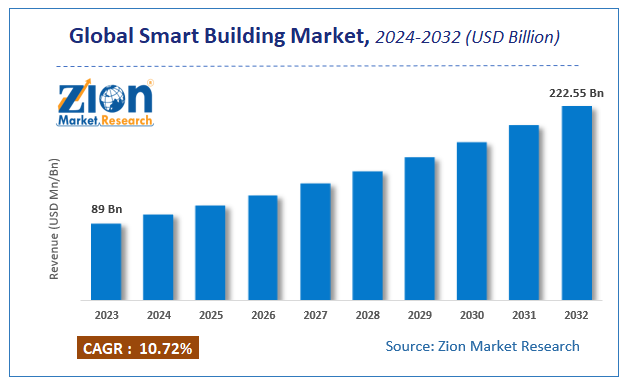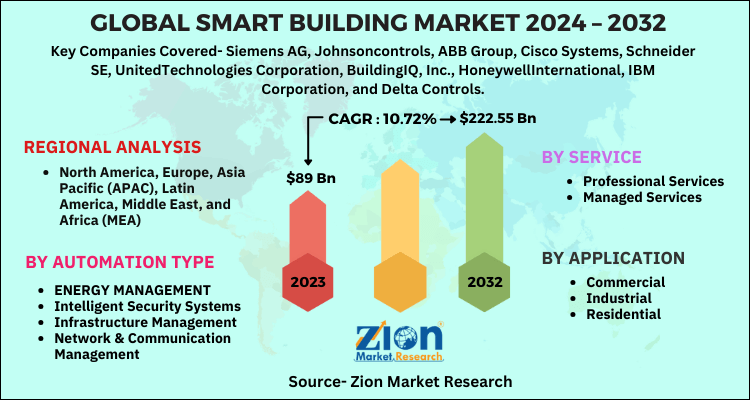Smart Building Market Size, Share, Trends, Growth 2032

Smart Building Market By Application (Commercial, Residential, and Industrial), By Automation Type (ENERGY MANAGEMENT, Infrastructure Management, Network & Communication Management, and Intelligent Security Systems), By Service (Professional Services and Managed Services), And By Region- Global Industry Perspective, Comprehensive Analysis, and Forecast, 2024-2032
| Market Size in 2023 | Market Forecast in 2032 | CAGR (in %) | Base Year |
|---|---|---|---|
| USD 89 Billion | USD 222.55 Billion | 10.72% | 2023 |
Smart Building Market Insights
Zion Market Research has published a report on the global Smart Building Market, estimating its value at USD 89 Billion in 2023, with projections indicating that it will reach USD 222.55 Billion by 2032. The market is expected to expand at a compound annual growth rate (CAGR) of 10.72% over the forecast period 2024-2032. The report explores the factors fueling market growth, the hitches that could hamper this expansion, and the opportunities that may arise in the Smart Building Market industry. Additionally, it offers a detailed analysis of how these elements will affect market demand dynamics and market performance throughout the forecast period.
Smart Building Market: Synopsis
Smart building is a kind of infrastructure making utilization ofautomation for controlling building operations includingventilation, air conditioning, heating, and lighting. Furthermore, sensors, microchips, and actuators are used in buildings forgathering data along with effectively handling its functions & activities. Moreover, smart building infrastructure assistsoperators as well as facility managers in enhancement of assetperformance which results in space optimization along with powerutility and minimizes impact of environmental pollution onstructures.
Smart Building Market: Growth Drivers
Surge in acceptance of IoT-based building management systemsalong with massive demand for power efficient tools will steergrowth of smart building market over upcoming years. Apart fromthis, evolution of 5G technology and growing smart city concepts isset to create new growth avenues for smart building industry overforecasting timeframe. Need for reducing operating costs, securitymanagement expenses, tenant management costs, and buildingperformance management charges will proliferate expansion of smartbuilding industry. Rise in need of safe & healthy workspace ispredicted to propel industry trends.
Furthermore, use of smart systems for sanitizing, proper officeventilating, temperature measuring, and space optimization willculminate into humungous elevation of size of smart building marketin coming years. Smart technology used in smart buildings can helpin tracking of movement of staff, thereby restricting spread ofdiseases.
With smart systems interacting with people & processesalong with offering real-time information to employers to ensuresafety of staff is projected to prop up demand for constructing ofsmart buildings across globe. Swift urbanization is set to spikegrowth of smart building market over forecasting timespan.Nonetheless, rise in cases of cyber-attacks in smart buildings canpose a threat to expansion of smart building industry overanticipated period.
Smart Building Market: Report Scope
| Report Attributes | Report Details |
|---|---|
| Report Name | Smart Building Market |
| Market Size in 2023 | USD 89 Billion |
| Market Forecast in 2032 | USD 222.55 Billion |
| Growth Rate | CAGR of 10.72% |
| Number of Pages | 165 |
| Key Companies Covered | Siemens AG, Johnsoncontrols, ABB Group, Cisco Systems, Schneider SE, UnitedTechnologies Corporation, BuildingIQ, Inc., HoneywellInternational, IBM Corporation, and Delta Controls. |
| Segments Covered | By Application, By Service, By Automation Type And By Region |
| Regions Covered | North America, Europe, Asia Pacific (APAC), Latin America, Middle East, and Africa (MEA) |
| Base Year | 2023 |
| Historical Year | 2018 to 2022 |
| Forecast Year | 2024 - 2032 |
| Customization Scope | Avail customized purchase options to meet your exact research needs. Request For Customization |
Smart Building Market: Regional Landscape
North America To Make Notable Contributions TowardsOverall Market Size By 2032
Introduction of green building initiatives is predicted tocreate strong growth platform for smart building market insub-continent. Growing concerns pertaining to power consumption hasresulted in demand for launching of new energy efficient systemsfor building, thereby driving regional market trends. Presence ofgiant firms in countries such as the U.S. will promulgate scope ofsmart building market growth in North America over forecastingtimespan.
Smart Building Market: Competitive Landscape
Key players favorably impacting growth of smart buildingindustry landscape and profiled in report are
- Siemens AG
- Johnsoncontrols
- ABB Group
- Cisco Systems
- Schneider SE
- UnitedTechnologies Corporation
- BuildingIQ, Inc.
- HoneywellInternational
- IBM Corporation
- Delta Controls
The global Smart Building Market is segmented as follows:
By Application
- Commercial
- Industrial
- Residential
By Service
- Professional Services
- Managed Services
By Automation Type
- ENERGY MANAGEMENT
- Intelligent Security Systems
- Infrastructure Management
- Network & Communication Management
By Region
- North America
- The U.S.
- Canada
- Europe
- France
- The UK
- Spain
- Germany
- Italy
- Rest of Europe
- Asia Pacific
- China
- Japan
- India
- South Korea
- Southeast Asia
- Rest of Asia Pacific
- Latin America
- Brazil
- Mexico
- Rest of Latin America
- Middle East & Africa
- GCC
- South Africa
- Rest of Middle East & Africa
Table Of Content
Methodology
FrequentlyAsked Questions
Surge in acceptance of IoT-based building management systems along with massive demand for power efficient tools will steer growth of smart building market over upcoming years. Apart from this, evolution of 5G technology and growing smart city concepts is set to create new growth avenues for smart building industry over forecasting timeframe. Need for reducing operating costs, security management expenses, tenant management costs, and building performance management charges will proliferate expansion of smart building industry. Rise in need of safe & healthy workspace is predicted to propel industry trends.
Zion Market Research has published a report on the global Smart Building Market, estimating its value at USD 89 Billion in 2023, with projections indicating that it will reach USD 222.55 Billion by 2032. The market is expected to expand at a compound annual growth rate (CAGR) of 10.72% over the forecast period 2024-2032.
North America will contribute lucratively towards the global market earnings over the projected timeline. The regional market surge is subject to introduction of green building initiatives. In addition to this, growing concerns pertaining to power consumption has resulted in demand for launching of new energy efficient systems for building, thereby steering regional market trends. Presence of giant firms in countries such as the U.S. will promulgate scope of smart building market growth in North America over forecasting timespan.
The key market participants include Siemens AG, Johnson controls, ABB Group, Cisco Systems, Schneider SE, United Technologies Corporation, BuildingIQ, Inc., Honeywell International, IBM Corporation, and Delta Controls.
RelatedNews
HappyClients
Zion Market Research
Tel: +1 (302) 444-0166
USA/Canada Toll Free No.+1 (855) 465-4651
3rd Floor,
Mrunal Paradise, Opp Maharaja Hotel,
Pimple Gurav, Pune 411061,
Maharashtra, India
Phone No +91 7768 006 007, +91 7768 006 008
US OFFICE NO +1 (302) 444-0166
US/CAN TOLL FREE +1 (855) 465-4651
Email: sales@zionmarketresearch.com
We have secured system to process your transaction.
Our support available to help you 24 hours a day, five days a week.
Monday - Friday: 9AM - 6PM
Saturday - Sunday: Closed






